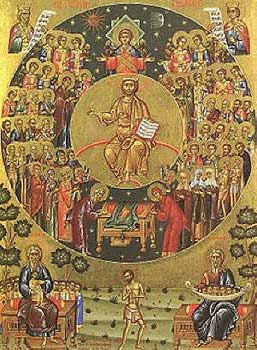
Saint Thomas the Fool-for-Christ was a monk in one of the monasteries in Caesarea of Cappadocia (Asia Minor). His obedience was to collect alms for the monastery. When the Blessed Thomas arrived in the city of Antioch, Syria he began his exploit of foolishness for the sake of Christ.
The steward of one of the churches, a certain Anastasius, became annoyed with the entreaties of St Thomas, and struck him on the cheek. Those present reproached Anastasius for his inappropriate manner of dealing with the fool, but St Thomas quieted them saying, "From this moment I shall accept nothing further from Anastasius, nor will Anastasius be able to give me anything further." These words proved prophetic. Anastasius died the very next day, and the saint also died along the road to his monastery, at the church of St Euthymius in the suburb of Daphne. They buried him at a place set aside for the burial of strangers.
After a certain while they buried another stranger in the saint's grave. After four hours the ground on the grave of the stranger was thrown aside. They again covered the grave, but in the morning the ground on the grave again lay open. They reburied the stranger in another place.
The same thing happened when they buried two women nearby. Everyone realized that St Thomas did not wish to have a woman buried over him. The occurrence was reported to Patriarch Domnus of Antioch (546-560). At his command the relics of St Thomas were transferred to Antioch and placed in a cemetery where the relics of many holy martyrs rested. A small church was built over these relics, from which many healings occurred.
Through the prayers of St Thomas a deadly plague ceased at Antioch. From that time the inhabitants began to honor the memory of St Thomas every year.
Back

 Saint Thomas the Fool-for-Christ was a monk in one of the monasteries in Caesarea of Cappadocia (Asia Minor). His obedience was to collect alms for the monastery. When the Blessed Thomas arrived in the city of Antioch, Syria he began his exploit of foolishness for the sake of Christ.
Saint Thomas the Fool-for-Christ was a monk in one of the monasteries in Caesarea of Cappadocia (Asia Minor). His obedience was to collect alms for the monastery. When the Blessed Thomas arrived in the city of Antioch, Syria he began his exploit of foolishness for the sake of Christ.